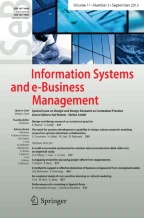Abstract
The idea of event detection is to identify interesting patterns from a constant stream of incoming news documents. Previous research in event detection has largely focused on identifying the first event or tracking subsequent events belonging to a set of pre-assigned topics such as earthquakes, airline disasters, etc. In this paper, we describe a new problem, called anticipatory event detection (AED), which aims to detect if a user-specified event has transpired. AED can be viewed as a personalized combination of event tracking and new event detection. We propose using sentence-level and document-level classification approaches to solve the AED problem for some restricted domains; given some user preferred topic event transition, we first train the corresponding event transition model, and then detect the occurrence of the transition for the stream of news covering the topic. Our experimental results on both terrorist-related and commercial events demonstrate the feasibility of our proposed AED solutions.
Similar content being viewed by others
Notes
Note that these two events represent villified former head of states, not terrorists per se and thus may not provide relevant training for our AED system to detect terrorists capture.
References
Allan J (2002) Topic detection and tracking: event-based information organization. Kluwer, Dordrecht
Allan J, Jin H, Rajman M, Wayne C, Gildea D, Lavrenko V, Hoberman R, Caputo D (1999) Topic-based novelty detection: final report. In: Proceedings of the DARPA broadcast news transcription and understanding workshop
Allan J, Lavrenko V, Jin H (2000) First story detection in tdt is hard. In: Proceedings of the 9th ACM conference on information and knowledge management (CIKM), pp 374–381
Allan J, Wade C, Bolivar A (2003) Retrieval and novelty detection at the sentence level. In: Proceedings of the 26th annual international ACM SIGIR conference on research and development in information retrieval, pp 314–321
Brants T, Chen F, Farahat A (2003) A system for new event detection. In: Proceedings of the 26th annual international ACM SIGIR conference on research and development in information retrieval, pp 330–337
Chen Y, Crawfordand MM, Ghosh J (2004) Integrating support vector machines in a hierarchical output space decomposition framework. In: IEEE international geoscience and remote sensing symposium, vol II, pp 949–952
Chua K, Ong W-S, He Q, Chang K, Kek A (2005) Intelligent portal for event-triggered sms alerts. In: Proceedings of the 2005 IEE mobility conference
Cortes C, Vapnik V (1995) Support-vector networks. Mach Learn 20(3):273–297
Grishman R, Sundheim B (1996) Message understanding conference—6: a brief history. In: Proceedings of the 16th international conference on computational linguistics, pp 466–471
He Q, Chang K, Lim EP (2006a) Anticipatory event detection via sentence classification. In: Proceedings of the 2006 IEEE international conference on systems, man, and cybernetics, pp #01512
He Q, Chang K, Lim EP (2006b) A model for anticipatory event detection. In: Proceedings of the 25th international conference on conceptual modeling (ER), vol 4215, Springer LNCS, pp168–181
Jin H, Schwartz R, Sista S, Walls F (1999) Topic tracking for radio, tv broadcast, and newswire. In: Proceedings of the DARPA broadcast news workshop, pp 199–204
Kumar S, Ghosh J (1999) GAMLS: a generalized framework for associative modular learning systems. In: Proceedings of 1999 SPIE conference on applications and science of computational intelligence II, SPIE Proc. vol 3722, pp 24–35
Kumaran G, Allan J (2004) Text classification and named entities for new event detection. In: Proceedings of the 27th annual international ACM SIGIR conference on research and development in information retrieval, pp 297–304
Lawrie D, Bruce Croft W (1999) Discovering and comparing topic hierarchies. In: Proceedings of the RIAO 2000 conference, pp 314–330
Morik K, Brockhausen P, Joachimss T (1999) Combining statistical learning with a knowledge-based approach—a case study in intensive care monitoring. In: Proceedings of the 16th international conference on machine learning (ICML), pp 268–277
Nallapati R, Feng A, Peng F, Allan J (2004) Event threading within news topics. In: Proceedings of the 13th international conference on information knowledge management (CIKM), pp 446–453
Quiggin T (2006) ‘Dark caves’ of secrecy can hinder intelligence. The Straits Times, Singapore, pp S12, Sep 30, 2006
Stokes N, Carthy J (2001) Combining semantic and syntactic document classifiers to improve first story detection. In: Proceedings of the 24th annual international ACM SIGIR conference on research and development in information retrieval, pp 424–425
Strader TJ, Tarasewich P, Nickerson RC (2004) The state of wireless information systems and mobile commerce research. Inf Syst E-Bus Manage 2(4):287–292
Sun A, Lim EP (2001) Hierarchical text classification and evaluation. In: Proceedings of the 2001 IEEE international conference on data mining (ICDM), pp 521–528
Author information
Authors and Affiliations
Corresponding author
Rights and permissions
About this article
Cite this article
He, Q., Chang, K. & Lim, EP. Anticipatory event detection via classification. ISeB 5, 275–294 (2007). https://doi.org/10.1007/s10257-007-0047-z
Published:
Issue Date:
DOI: https://doi.org/10.1007/s10257-007-0047-z
